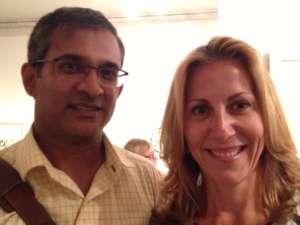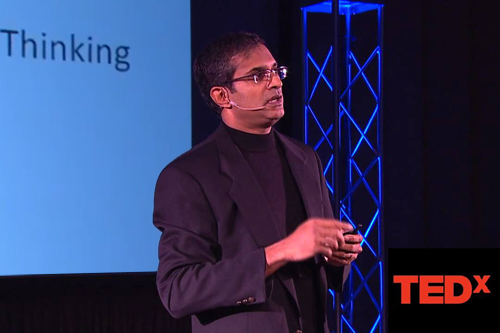 This week we’re featuring a series of five conversations between Rewire Me founder Rose Caiola and Krishna Pendyala, life coach and author of Beyond the PIG and the APE. Below is the third installment of the series.
This week we’re featuring a series of five conversations between Rewire Me founder Rose Caiola and Krishna Pendyala, life coach and author of Beyond the PIG and the APE. Below is the third installment of the series.
ROSE: In your book, Beyond the PIG and the APE, you write about distinguishing between intuition and instinct. That can be very tricky.
KRISHNA: Instinct is really from survival patterns.
ROSE: It’s a defense mechanism in a way.
KRISHNA: Yes, it’s a reaction. It’s very reactive in nature. And you say ”natural instinct,” “survival instinct,” right? And I think there’s another kind of instinct that I’m going to loosely call ”cognitive instinct.” If you’ve read the book Blink, Malcolm Gladwell talks about “thin slicing,” where, if you get a couple of cues, you can leap to a conclusion and be right. And many times people are right, but that’s not intuition. That is still experience, because intuition has been defined as a direct perception of truth or fact independent of any reasoning process. “Intuition is the supra-logic that cuts out all routine processes of thought and leaps straight from the problem to the answer.” That’s one definition by the poet Robert Graves. “Intuition comes very close to clairvoyance; it appears to be the extrasensory perception of reality.” That’s Alexis Carrell, the French biologist and surgeon.
And so, in philosophy it is the immediate cognition of an object, not inferred or determined by a previous cognition of the same object. And that’s why I separate it from thin slicing.
By the way, these words are used interchangeably a lot. In fact, on Dictionary.com, the fourth definition of instinct is natural intuitive power. So now you know why there’s confusion.
ROSE: But they are similar in terms of how we are conditioned. We cannot understand the difference, because we’re living in survival mode most of the time.
KRISHNA: We are?
ROSE: Maybe not you and me, constantly, but most of society lives in that survival mode.
KRISHNA: Let’s define “survival” as life and death. And yes, there are some parts of the world where it is survival—life and death. And those people, absolutely, they are in that state, but most of the developed world is not living with life and death—they’re in imaginary life-and-death situations, which is another manifestation of the ego. They’re making mountains out of molehills. And when you make a mountain out of a molehill, who did it? Your monkey mind?
ROSE: Exactly. We’re all living in the monkey mind. Most of us are living in that monkey mind and therefore we’re not able to distinguish between instinct and intuition. And I can see how so many people can get that confused—what instinct and intuition are. You’re very clear about that in your book, in the way you explain it. So I just found that fascinating how most of us don’t really understand the difference, that there is even a difference between the two.
KRISHNA: Thank you for pointing it out. Again, I had an intention. It was not semantics; I was not trying to prove a point other than the following. I’ll give you an example: gut. Usually, when we use the word “gut,” it goes with the word “instinct”: gut instinct. We don’t say “gut intuition,” but gut could be either instinct or intuition, in my opinion. Because I remember once, I was driving to the airport, and I had a gut feeling that I shouldn’t get on the plane that day, but I did. That particular plane had a landing problem. Nothing happened, nobody died, but still, every time I go by that road, around the same spot I get the same feeling. Which one is it? That became my challenge. Which one do I trust and which one don’t I trust? One was fear and one was intuition. If I had skipped all the flights since that time, I would have gotten fired from a couple of jobs because I wouldn’t have shown up at meetings because of fear. So I asked myself, How can I tell which one is intuition and which one is fear or instinct? And it is based on how I feel. If there is clarity and no anxiety or urgency for me, again this may not be the case for everyone, but that to me is intuition. If intuition is guiding me, I have no sense of anxiety or urgency; it is very calm….
Knowing is the key word—when you know something, there is clarity; when you think, there is doubt. When you use the phrase ”I think so,” innately there is a doubt in that sentence, but “I know so” doesn’t present doubt. Sometimes your ego can trick you and make you say “I know so,” but if you’re aware, you can see the difference between “I think so” and “I know so.”
Once somebody asked me, “Where does belief fit into thinking and knowing?” And I think it beautifully fits in between, because belief is something true for you, but there isn’t necessarily evidence to prove it.
Tomorrow, Rose talks with Krishna Pendyala about three levels of choice.
Related Articles
- Editors’ Pick: Beyond the PIG and the APE, by Krishna Pendyala
- Conversations with Krishna Pendyala (Part I): On animal acronyms, self-esteem, and delaying gratification
- Conversations with Krishna Pendyala (Part II): Egos, monkey minds, and letting our children fall
- Conversations with Krishna Pendyala (Part IV): Three levels of choice
- Conversations with Krishna Pendyala (Part V): The Mindful Nation Foundation
Post Disclaimer
This content is for informational purposes only and does not constitute medical advice. Please consult a healthcare professional for any medical concerns.




2 Comments
Kelly Lau
I couldn’t agree more with being able to relate more to stories about life, incidents, and anecdotes.
Thank you.
Gordon Peters
Great first question/topic.. Distinguishing between intuition and instinct, it was very well laid out throughout the conversation. I also have to admit that I am guilty of making mountains out of molehills.
Another good conversation. Thanks!
Gordon